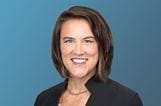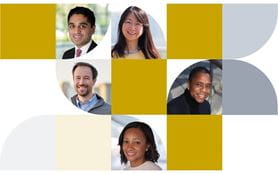A&O Consulting: increasing demand in a post pandemic world
Related people
Headlines in this article
Related news and insights
Publications: 18 March 2022
Russia's invasion of Ukraine and the importance of an operational and cyber risk defence
Publications: 02 December 2021
The Trust Gap: Expectations vs. Reality in workplace misconduct and why you need to take action NOW
Publications: 16 November 2020
Panel discussion: the road to racial equality in the legal profession and wider business world
Publications: 19 March 2020
With A&O Consulting in its second year, three of its executive directors explain the pressures stoking demand for the consultancy’s advice and how, post-pandemic, that is likely to grow.

The launch of A&O Consulting (AOC) was timely. When it opened for business in September 2018, market demand was clearly there. Then, as now, businesses faced ever-greater scrutiny from regulators, consumers and the public to operate responsibly.
The pandemic has further accelerated the pace and scale of change; clients have to deal with a multitude of new challenges around efficiency, regulation and growth for which they seek guidance on best practice, internal processes, governance and corporate culture.
Cue AOC, the firm’s strategic regulatory consulting arm, established at the behest of clients whose requests for top-tier regulatory guidance were going unmet. It’s not a separate company; rather, AOC is an integrated part of A&O. When required, it works collaboratively with the firm’s legal practice, but also operates as a standalone unit.
AOC has attracted people of considerable talent with extensive experience in regulation, consulting and/or in-house legal and compliance operations. The business operates globally and currently comprises 24 consultants based in the UK, U.S. and Australia.
Although AOC on its own doesn’t provide legal advice, several of AOC’s consultants have studied law, and a few practised at law firms and in-house before joining A&O Consulting. Among them are Catie Butt, who joined the New York office in May 2019, and Kate Morris, who joined the Sydney office in January 2020, while Claire Haydon, who joined the London office in January 2020, has a regulatory background.
What drew the executive directors to AOC?
Catie, Claire and Kate all say that AOC offered a big opportunity for them for a number of reasons. Chiefly, they were attracted by the prospect of working for a new venture supported by the major resources of a global organisation. As Kate says: “It’s a fantastic combination: there is all the energy and enthusiasm of a start-up, underpinned by a globally established, top law firm.”
Catie was particularly intrigued by the notion of using her broad range of professional experiences to offer timely and relevant transformation-related offerings for clients. “After having been on the client side for the majority of my career, I’m like a kid in a candy store being able to collaborate with legal practice groups, AOC colleagues and Advanced Delivery & Solutions teams to offer practical solutions to in-house challenges.”
For Claire, working for AOC meant an opportunity to join a leading global law firm. “I’d obviously instructed law firms over the years but I was really attracted by the idea of seeing one from the inside. Everything I’d heard about A&O before joining the consulting business is true – and more.”
A second draw for them all was the firm’s commitment to innovation, which is at the heart of its relentless drive to transform the way it delivers its services, encapsulated in the overarching concept of Advanced Delivery & Solutions. After starting, all three executive directors benefitted from a third core attribute supporting the consulting business: the culture of collaboration among the various practice groups, which has been vital in AOC’s growth.
It’s a fantastic combination: there is all the energy and enthusiasm of a start-up, underpinned by a globally established, top law firm.
Each of the three brings insights and experience from their former roles. In Claire’s case, that includes 16 years working for the Financial Conduct Authority and its predecessor, as well as for one of the major banks in the UK.
Kate began her career as a litigator in private practice before working for 12 years for global and Australian banks in business, legal and compliance roles.
Catie worked for 20 years as an in-house commercial lawyer, where one of the major projects she was involved in was outsourcing her company’s global in-house legal function, overseeing the transition and then supervising the outsourced legal function itself.
Each also brings their own specialism to the consultancy business. Claire concentrates on regulatory strategy, risk management and governance.
Kate is supporting businesses with the massive volume of change across the financial services sector in Australia; this has been, and will continue to be, significantly impacted by changing regulations following on from the Royal Commission into Misconduct in the Banking, Superannuation and Financial Services Industry, as well as the inquiry by the Australian Prudential Regulation Authority into governance, culture and accountability.
Catie’s focus is on legal and business function transformation. She has been working with Jonathan Brayne, Chair of Fuse (A&O’s tech innovation space), on the series of feature articles and benchmark surveys about the changing nature of the in-house legal world. “It’s great to be part of that conversation,” Catie says.
All of this plays well into the AOC offering, but the key question is: what can AOC offer that’s not already provided by established consulting firms such as the Big Four?
Claire, Kate and Catie believe AOC has two key differentiators: first, the fact that all consultants in AOC can advise from a position of real experience; and second, the tie-up with expert legal advice, as and when required. Catie puts it this way: “Our clients receive the best of A&O based on skill, not geography. We offer a complementary skillset to our lawyers which helps our clients consider their risks from different but equally important angles – as well as being able to implement the legal advice they receive, rather than employing a third-party consultancy firm to do it.
“Additionally, as several clients operate internationally, our global presence and experience in various jurisdictions means we’re able to assist them more efficiently.”
Claire adds: “Importantly, we’re not consulting as lawyers, although we do have some lawyers in the team. Our main selling point is that we have practical industry experience. We can translate what we know into pragmatic, implementable and sustainable action.”
Kate sums it up: “Historically, large consultancy firms have dominated the regulatory market, but we’re offering something more integrated: we’re offering top-quality legal advice from our lawyers, combined with technical guidance and support from us on how to implement that advice. Our value is in our experience: what we can tell our clients is ‘We’ve done the job you’re trying to do.’”
In Catie’s case, it’s experience of a major exercise in business transformation. This was the outsourcing of the legal function of DXC Technology (which was born from a merger between CSC and Hewlett Packard’s Enterprise Services division) to UnitedLex. She then joined UnitedLex for almost two years to serve as global operations executive for the DXC project.
“Overseeing such a major project has put me in a very strong position to help companies with their own transformations, which are becoming increasingly common,” she notes. “I can apply my in-house and service provider experiences not just in the in-house legal function world but to business transformation more generally.”
With such a compelling business offering, it’s no surprise that AOC is winning its own clients, and not just serving the firm’s clients in a different format.
Kate mentions a final point of distinction between AOC and the competition: “There are some established boutique firms that offer risk-focused advice, and I’ve been a customer of these firms. But A&O’s offering is of a different calibre. I wish it had been available when I was buy-side.”

Diversity and inclusion
Increasingly, AOC is being asked to guide clients on their approach to diversity and inclusion (D&I), and the practical steps they can take to move forward. Catie sees D&I as integral to company transformation objectives. “D&I is now at the heart of a company’s business, impacting everything from recruitment and retention of people right through to corporate purpose,” she says. “Get D&I right and the whole business benefits.”
To date, the focus of D&I has to a greater extent been on gender diversity, but this is expanding to fairer representation of ethnic minorities and to sexual identity. Claire points out that AOC itself has been set up to be diverse and inclusive, taking on people from a broad range of backgrounds, experiences and cultures.
D&I advice can be a real test of the skills of the consultant in helping clients address what are perceived as failings, suggesting how problems can be addressed, developing policies and then guiding them to put those policies into practice. Advice needs to be both smart and sensitive.
Catie says how the advice is delivered is crucial in creating a bond between client and consultant: “It’s important to appeal to people’s desire to learn and get things to a better place over time. We have shown that we can be sensitive to clients’ challenges, without lecturing them, yet facilitating change.”
All three acknowledge that this requires consultants to have a range of skills, beyond the technical and functional.
The disruptive impact of the Covid-19 pandemic has obviously had a significant effect on the business, for example putting a temporary hold on recruitment. However, at the same time, it’s presenting new challenges for businesses of all sizes in all sectors and therefore requiring guidance from expert consultants. Claire, Kate and Catie all report a continued – even increased – demand for their services.
With the lockdown resulting in high numbers of people working from home, there’s been an acceleration of trends affecting how people work, including, inevitably, the issues around work-life balance.
Kate points out the link between working from home and D&I. “The essence of D&I is people bringing their whole selves to work,” she says. “What we’ve seen with video conferencing and remote working is that people have no choice but to be themselves in their home environment even as they’re working. All of us see each other more completely in that way. My dog has been known to make a guest appearance in team meetings – that’s something that wouldn’t have happened before!”
The five pillars of A&O Consulting’s business are:
- Governance: Applying global best practice to increase the effectiveness of governance and drive sustainable business outcomes
- Corporate purpose and culture: Unlocking people’s full potential by embedding the right values – or, put another way, provide them with vision, purpose and strategy
- Conduct, compliance and operational risk: Developing innovative approaches to managing the evolving risk landscape
- Regulatory strategy and implementation: Keeping pace with regulators wherever in the world businesses operate
- Business and legal function transformation: Helping clients make their business and legal operations future-fit
Here are examples of commissions on which A&O Consulting has been asked to advise:
- Undertaking a culture health assessment for a large corporate, including a review of conduct risk framework and recommendations for improvement.
- Training the Board of an APAC asset manager on directors’ duties and responsibilities, risk management, conduct and culture and changes to the regulatory environment.
- Transforming a legal service provider’s strategy for legal solutions outsourcing transactions, including refresh of contract templates and the design of an effective governance framework.
- Conducting a Board and executive-level governance effectiveness review for a large UK FinTech against regulatory and governance code requirements.
- Training the Markets and Treasury functions of an Australian bank on their regulatory and ethical responsibilities (conducted by AOC), as well as providing independent endorsement of the training (carried out by A&O).

Download the yearbook
Read our full Alumni Yearbook 2020
Download PDF




